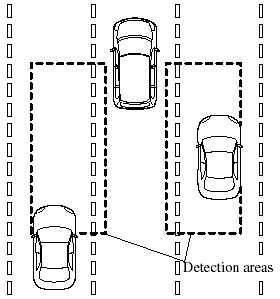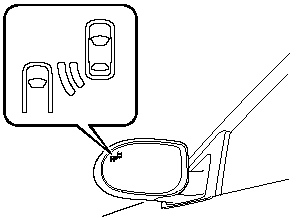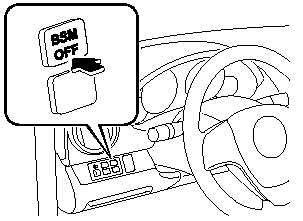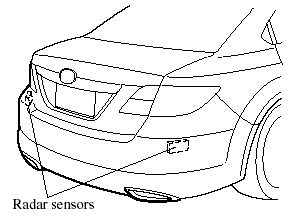Blind Spot Monitoring (BSM) System
The Blind Spot Monitoring (BSM) system is designed to assist the driver by
monitoring
blind spots on both sides of the vehicle to the rear in certain situations such
as when
changing lanes on roads and freeways.
The BSM system monitors the detection areas on both sides of the vehicle to the
rear when
the vehicle speed is about 32 km/h (20 mph) or more, and notifies the driver of
vehicles in
the detection area by illuminating the BSM warning light.
If the turn signal lever is operated in the direction the BSM warning light is
illuminated, the
system warns the driver of the vehicle in the detection area with a beep sound.

WARNING:
Do not rely completely on the BSM system and be sure to look over your shoulder
before changing lanes:
The BSM system can assist the driver in confirming the safety of the
surroundings
but is not a complete substitute. The driver is responsible for assuring lane
changes
and other maneuvers. Always pay attention to the direction in which the vehicle
is
traveling and the vehicle's surroundings.
NOTE:
- The BSM system does not operate when the vehicle speed is lower than about 32
km/h (20 mph).
- The radar sensors are equipped inside the rear bumper.
- The radar sensors do not detect human, animal, or static objects such as
fences. In addition, the
system pauses when the selector lever is shifted to the R position. (The system
resumes
automatically when the selector lever is shifted from the R position.).
- The detectability of the radar sensors has its limitations. The BSM system may
not operate
properly under the following conditions:
- Ice, snow, or soil adheres to the rear bumper surface
around the radar sensors.
- During adverse weather conditions such as rain or snow, or under conditions where water is sprayed.
- The rear bumper area around the radar sensors is blocked by foreign material (such as stickers or a bicycle carrier).
- The radar sensors may not detect all types of vehicles around your vehicle,
especially the
following types of vehicles:
- Motorcycles
- Vehicles with body shapes that radar may not reflect such
as a flatbed trailer with no cargo.
- Vehicles with lower body height such as sports cars.
- Have the radar sensors inspected at an Authorized Mazda Dealer if any shock is
applied to the
rear bumper, even in a minor accident. If the vehicle is driven with a damaged
radar sensor, the
system may not operate properly resulting in an accident.
- For repairs or paintwork around the radar sensors, or replacement of the
bumper, consult an
Authorized Mazda Dealer.
- The radar sensors of the BSM system may be regulated under the radio wave
related laws of the
country where the vehicle is driven. The sensors in this system are approved for
use in the U.S.A.
(including territories), Canada, and Mexico. If a vehicle with a BSM system is
driven in a country
other than the U.S.A., Canada, or Mexico, the system has to be turned off using
the BSM OFF
switch.
- The detection area of the system has been determined based on the lane width
of general
freeways. Therefore on a road with a narrower lane width, the system may detect
vehicles on a
lane next to the adjacent lane and operate the warning light/beep. On a road
with wider lane
width, the system may not detect vehicles on the adjacent lane and may not
operate the warning
light/beep.
- Operation of the warning light/beep may be delayed or the system may not
operate the warning
light/beep under the following conditions:
- The vehicle accelerates from a standing-start with a
vehicle alongside.
- A vehicle moves from a lane two lanes over to the adjacent lane.
- The difference in vehicle speed between your vehicle and
another vehicle is larger when
passing or being passed, and the vehicle passes the detection area within a
short period of
time.
- On a steep incline, or when there is a difference in height between lanes.
- Immediately after the system has been activated by pressing
the BSM OFF switch again after it
has been turned off (BSM OFF indicator light in instrument panel illuminates) by
pressing the
switch.
- Although the system may detect objects on the road side such as parked vehicles or guardrails and operate the warning light/beep, it does not indicate a malfunction.
- If the vehicle is driven on a road with less traffic and few vehicles that the
radar sensors can
detect, the system may pause (The BSM OFF indicator light in the instrument
panel flashes).
However, it does not indicate a malfunction.
- The following conditions may affect the visibility of the BSM warning lights
on the outside mirror,
making it difficult to confirm the illumination of the lights:
- Ice or snow adheres to the surface of the outside mirrors.
- The door window glass is tinted.
BSM Warning Light/Beep
BSM warning light

Equipped on the left and right door mirrors.
This warning light illuminates for a few seconds when the ignition is switched ON.
If the BSM system detects a vehicle in the detection area while the vehicle is driven at a speed of about 32 km/h (20 mph) or more, the BSM warning light illuminates on the side of the vehicle where the rear on-coming vehicle is detected.
NOTE:
- If ice or snow adhere to the outer mirror
surface, the BSM warning light may not be
visible.
- If the door window glass is tinted, it may affect the visibility of the BSM warning light, making it difficult to confirm the illumination of the light.
BSM warning beep
The warning beep operates when the turn signal lever is operated to the side where the BSM warning light is illuminated.
NOTE:
The system can be personalized so that the
BSM warning beep does not operate. Refer to
Personalization Features.
BSM OFF Indicator Light

This indicator light illuminates for a few seconds when the ignition is switched ON.
The BSM OFF indicator light illuminates when the BSM system is turned off by pressing the BSM OFF switch.
The indicator light flashes if the BSM system has a malfunction. Consult an Authorized Mazda Dealer.
NOTE:
If the vehicle is driven on a road with less
traffic and few vehicles that the radar sensors
can detect, the system may pause (The BSM
OFF indicator light in the instrument panel
flashes). However, it does not indicate a
malfunction.
BSM OFF Switch

When the BSM switch is pressed, the BSM system turns off and the BSM OFF indicator light illuminates.
Press the BSM OFF switch again to turn on the BSM system. The BSM OFF indicator light turns off.
NOTE:
If the ignition is switched off (LOCK) with the
BSM system turned off, the system becomes
operable automatically when the ignition is
switched ON.
Care of Radar Sensors

The radar sensors are equipped inside the rear bumper.
Always keep the bumper surface near the radar sensor area clean so that the BSM system operates normally. Refer to the Exterior Care.
NOTE:
- The BSM OFF indicator light flashes if the
radar sensors cannot operate normally. If
the light remains flashing after cleaning the
bumper surface near the radar sensor area,
consult an Authorized Mazda Dealer.
- For repairs or paintwork around the radar sensors, or replacement of the bumper, consult an Authorized Mazda Dealer.
Safety Certification
Radiation Hazard
This BSM (blind spot monitoring) device emits intentional electromagnetic radiation in the 24 GHz to 25 GHz frequency range. The total radiated average power over the entire bandwidth is below _14 dBm (40 µW). The active emitting antenna surface is 72 cm2; therefore the radiated power density in front of the BSM device is 0.55 µW/cm2.
This value is far below the legal human exposure protection limit of 1 mW/ cm2(MPE) in Europe and US.
Declaration of compliance for 24 GHz blind spot radar
(U.S.A)
FCC ID: KR5SV2008BSD
This vehicle is equipped with a 24 GHz
blind spot monitoring (BSM) radar
system, which complies with part 15 of
the FCC rules. Operation is subject to the
following conditions:
1. This device may not cause harmful
interference, and.
2. This device must accept any interference received, including interference that may cause undesired operation.
3. This device may only work when the vehicle is in operation pursuant to § 15. 252 (a) (4).
(CANADA)
ICDCE2008075 (temporary permission until RSS-220 is in force)
This vehicle is equipped with a 24 GHz
blind spot monitoring (BSM) radar
system, which complies with the (actually
draft) RSS-220 standard of Industry
Canada. Operation is subject to the
following conditions:
1. This device may not cause harmful
interference, and.
2. This device must accept any interference received, including interference that may cause undesired operation.
3. This device may only work when the vehicle is in operation pursuant to RSS-220 5.2 (b)
(MEXICO)
RLVSISV07-725 (duration: June 18, 2008).
Brand: Siemens VDO.
Model: TYPE SV2007 BSD.
NOTE:
During printing time of this user manual the
approvals listed below are granted. Further
countries may become available or actual
certification identifiers may be subject to
change or update.
WARNING:
Changes or modifications not
expressively approved by the party
responsible for compliance could void
the user's authority to operate the
equipment.
See also:
Starting the Engine
NOTE.
Engine-starting is controlled by the spark
ignition system.
This system meets all Canadian Interference-
Causing Equipment Standard requirements
regulating the impulse electrical field stre ...
Accessory Sockets
The ignition switch must be in the ACC
or ON position to prevent the battery from
discharging.
Only use genuine Mazda accessories or
the equivalent requiring no greater than
120 W (DC 12 V, 7 A ...
Mazda 5 Facelift - An even Quieter Place to be
Mazda 5 facelift is not only more practical and easier to use, it is also a quieter
place to be, making its passenger cell even more communicative and relaxing. Engine
sound, for instance, has bee ...


